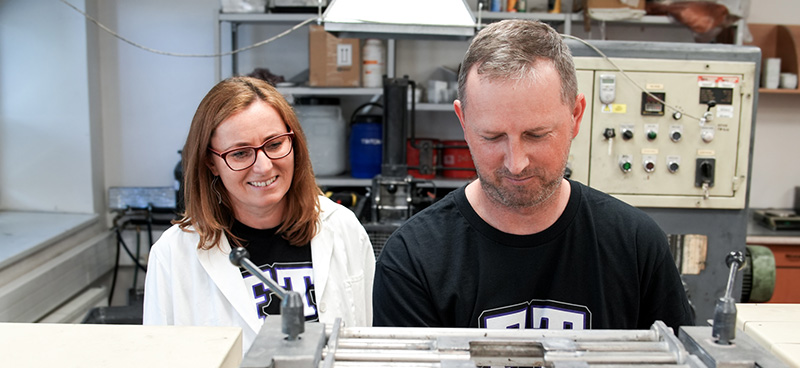
A New Elastomer Resistant to Radiation, Oil and Extreme Temperatures Is Being Developed at the FT. It Aims to Boost Nuclear Plant Safety
11. August 2025The Faculty of Technology at Tomas Bata University in Zlín is launching a new research project focused on developing a special rubber material designed for use in the extreme conditions of the nuclear energy sector. The project, entitled “Rubber Seals for Radiation and Chemically Harsh Environments”, has received funding through the THÉTA 2 programme of the Technology Agency of the Czech Republic. Within the sub-programme targeting energy technologies, the project ranked as the third highest-rated proposal overall – and the top-rated among those where a university acts as a principal investigator.
The four-year project will be conducted in collaboration with MICo servis, spol. s r.o., based in Třebíč – one of Europe’s leading manufacturers of seals for nuclear power plants with VVER-type reactors. The total project budget is nearly CZK 15 million, with CZK 6.8 million allocated to the Faculty of Technology.
Soft rubber that can withstand it all
The goal of the research is to develop a soft yet highly durable rubber material that maintains its elasticity and sealing properties even after 6 to 8 years of operation – in conditions where standard rubbers typically fail. These include high temperatures, oil aerosols, aggressive chemicals and ionising radiation – such as those found in the circulation pumps of nuclear reactors, which are critical for cooling.
“At the outset, we need to precisely define the demands placed on the material – the temperatures, levels of radiation, and chemical exposure it must endure. Then, we need to find or formulate a compound that can withstand all of that without losing its flexibility or sealing capacity. Technically, it’s a very demanding task, but one that is crucial for operational safety,” explains the project’s principal investigator, Ing. Simona Mrkvičková, Ph.D., from the Faculty of Technology of TBU.
Current sealing materials – often based on EPDM – are unsuitable due to either excessive hardness or low resistance to oils. The situation is further complicated by the fact that many existing components originate from Russia, making replacement increasingly problematic. Developing a fully certified domestic alternative will therefore help strengthen the self-sufficiency and long-term safety of the Czech nuclear infrastructure.
Testing, simulation and industry collaboration
The project builds on previous successful collaboration between TBU and MICo servis, during which a sealing material for reactor containment areas was developed. The new research, however, raises the bar significantly – it includes not only the development of a new compound, but also the creation of a comprehensive qualification procedure, testing of both commercially available and proprietary materials, the design and production of prototypes, long-term operational simulations, and testing under accident conditions, which will be carried out by the Nuclear Research Institute in Řež.
The outcome? Safer, more self-sufficient nuclear operations
The project will result in an innovative rubber seal that meets international standards and can be applied not only in the Czech nuclear industry. It also strengthens the link between academic research and industrial application – combining the technological expertise of the Faculty of Technology with the practical experience of MICo servis, which oversees the design, manufacture and professional installation of sealing components.